Management Science: Refinery Optimization Using Linear Programming
VerifiedAdded on 2020/06/06
|18
|2032
|111
Report
AI Summary
This report presents a comprehensive analysis of refinery optimization using linear programming as a decision support tool. The study focuses on maximizing profit by efficiently managing resources and optimizing various processes, including distillation, reforming, cracking, and blending. The report constructs a detailed diagram illustrating the different products and processing stages within the refinery. It formulates and discusses the optimal solution based on outcomes assessed through a solver, considering variables such as crude oil inputs, intermediate products (naphthas, oils), and final outputs (premium petrol, regular petrol, jet fuel, fuel oil, lube oil). The analysis includes the development of linear programming models, considering constraints related to crude oil availability, processing capacities, and product specifications (e.g., octane numbers). The report concludes with a detailed interpretation of the results, highlighting the profit generated from different products and the overall profitability of the refinery, which is determined to be £24,723,869. The report also includes appendices with abbreviations and detailed data tables.

Management Science for Decision Support
Paraphrase This Document
Need a fresh take? Get an instant paraphrase of this document with our AI Paraphraser
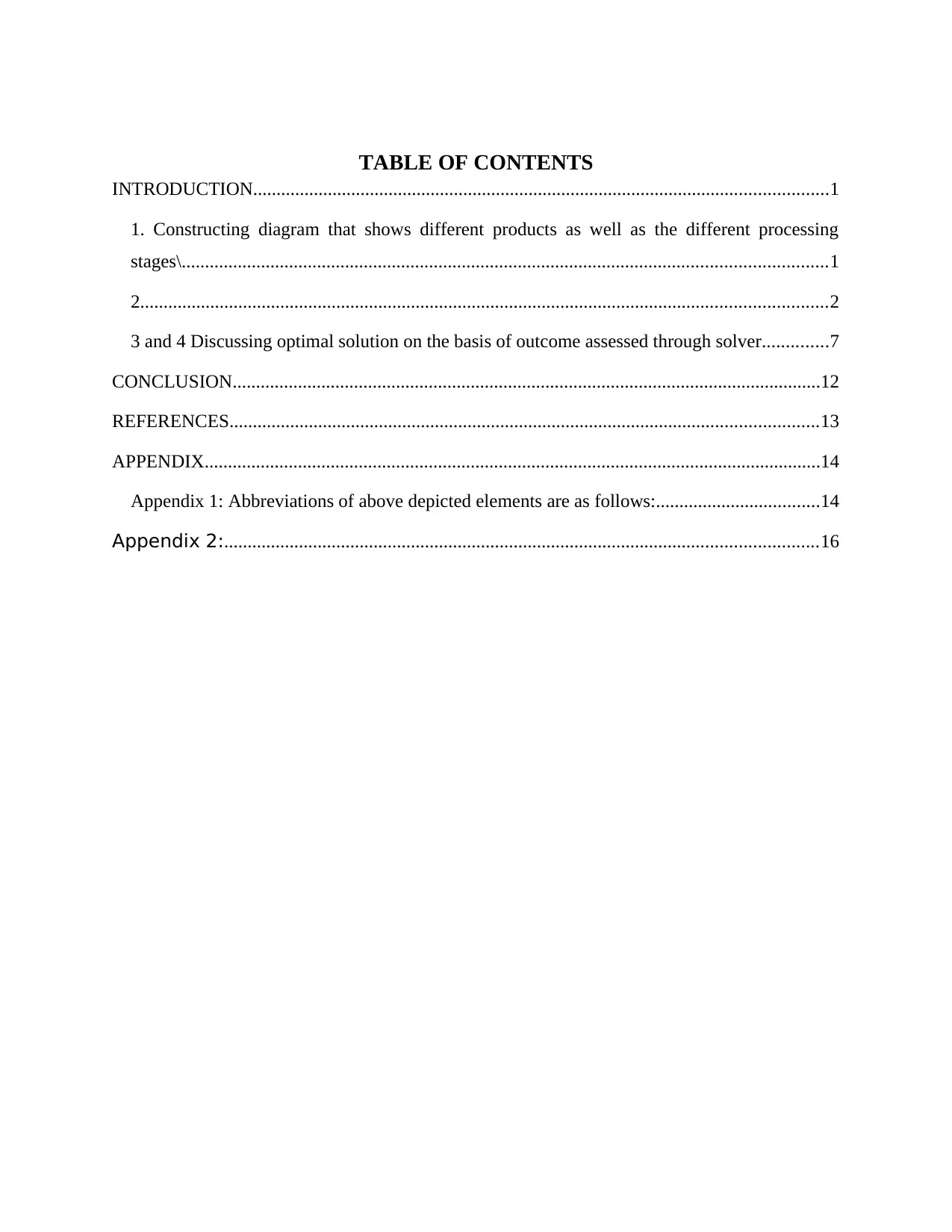
TABLE OF CONTENTS
INTRODUCTION...........................................................................................................................1
1. Constructing diagram that shows different products as well as the different processing
stages\..........................................................................................................................................1
2...................................................................................................................................................2
3 and 4 Discussing optimal solution on the basis of outcome assessed through solver..............7
CONCLUSION..............................................................................................................................12
REFERENCES..............................................................................................................................13
APPENDIX....................................................................................................................................14
Appendix 1: Abbreviations of above depicted elements are as follows:...................................14
Appendix 2:...............................................................................................................................16
INTRODUCTION...........................................................................................................................1
1. Constructing diagram that shows different products as well as the different processing
stages\..........................................................................................................................................1
2...................................................................................................................................................2
3 and 4 Discussing optimal solution on the basis of outcome assessed through solver..............7
CONCLUSION..............................................................................................................................12
REFERENCES..............................................................................................................................13
APPENDIX....................................................................................................................................14
Appendix 1: Abbreviations of above depicted elements are as follows:...................................14
Appendix 2:...............................................................................................................................16
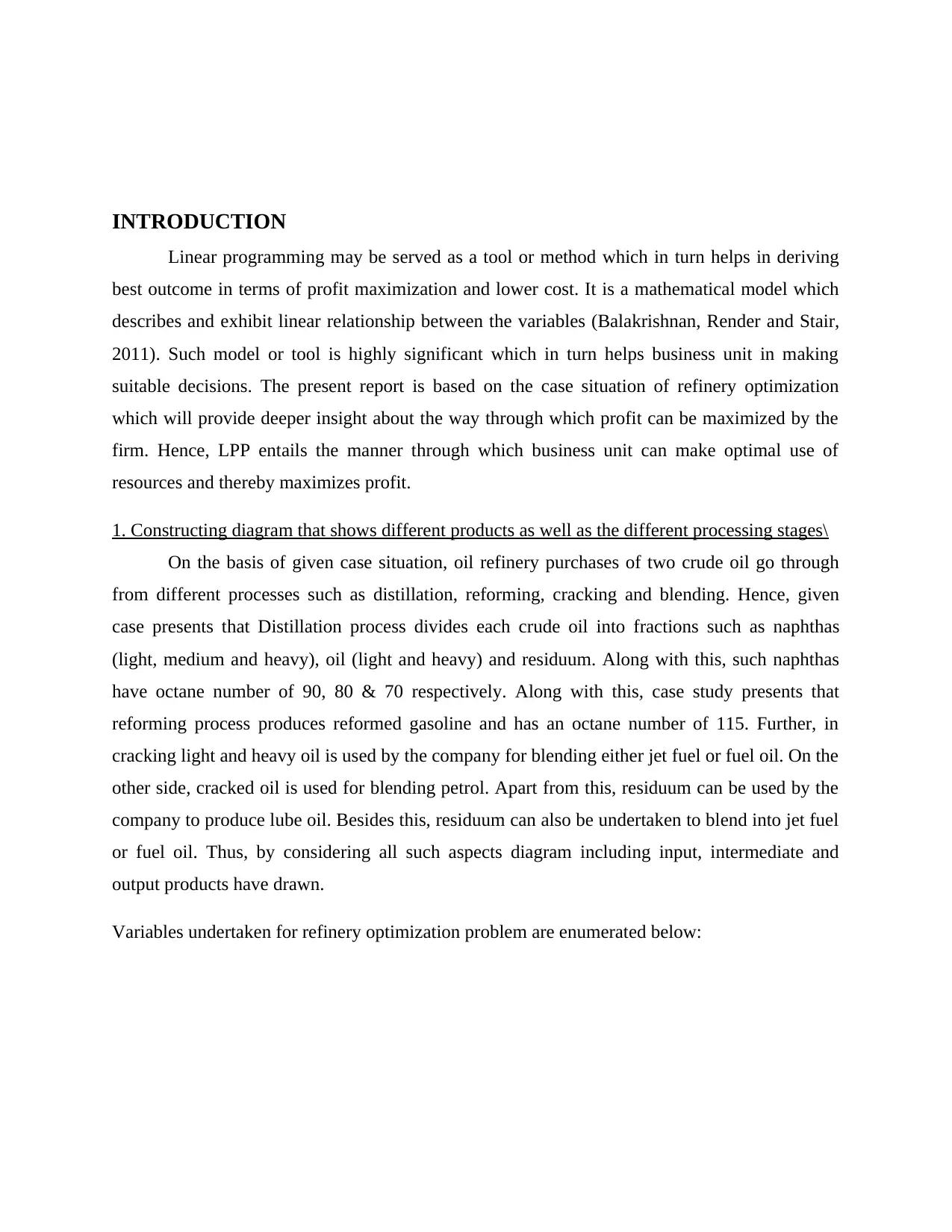
INTRODUCTION
Linear programming may be served as a tool or method which in turn helps in deriving
best outcome in terms of profit maximization and lower cost. It is a mathematical model which
describes and exhibit linear relationship between the variables (Balakrishnan, Render and Stair,
2011). Such model or tool is highly significant which in turn helps business unit in making
suitable decisions. The present report is based on the case situation of refinery optimization
which will provide deeper insight about the way through which profit can be maximized by the
firm. Hence, LPP entails the manner through which business unit can make optimal use of
resources and thereby maximizes profit.
1. Constructing diagram that shows different products as well as the different processing stages\
On the basis of given case situation, oil refinery purchases of two crude oil go through
from different processes such as distillation, reforming, cracking and blending. Hence, given
case presents that Distillation process divides each crude oil into fractions such as naphthas
(light, medium and heavy), oil (light and heavy) and residuum. Along with this, such naphthas
have octane number of 90, 80 & 70 respectively. Along with this, case study presents that
reforming process produces reformed gasoline and has an octane number of 115. Further, in
cracking light and heavy oil is used by the company for blending either jet fuel or fuel oil. On the
other side, cracked oil is used for blending petrol. Apart from this, residuum can be used by the
company to produce lube oil. Besides this, residuum can also be undertaken to blend into jet fuel
or fuel oil. Thus, by considering all such aspects diagram including input, intermediate and
output products have drawn.
Variables undertaken for refinery optimization problem are enumerated below:
Linear programming may be served as a tool or method which in turn helps in deriving
best outcome in terms of profit maximization and lower cost. It is a mathematical model which
describes and exhibit linear relationship between the variables (Balakrishnan, Render and Stair,
2011). Such model or tool is highly significant which in turn helps business unit in making
suitable decisions. The present report is based on the case situation of refinery optimization
which will provide deeper insight about the way through which profit can be maximized by the
firm. Hence, LPP entails the manner through which business unit can make optimal use of
resources and thereby maximizes profit.
1. Constructing diagram that shows different products as well as the different processing stages\
On the basis of given case situation, oil refinery purchases of two crude oil go through
from different processes such as distillation, reforming, cracking and blending. Hence, given
case presents that Distillation process divides each crude oil into fractions such as naphthas
(light, medium and heavy), oil (light and heavy) and residuum. Along with this, such naphthas
have octane number of 90, 80 & 70 respectively. Along with this, case study presents that
reforming process produces reformed gasoline and has an octane number of 115. Further, in
cracking light and heavy oil is used by the company for blending either jet fuel or fuel oil. On the
other side, cracked oil is used for blending petrol. Apart from this, residuum can be used by the
company to produce lube oil. Besides this, residuum can also be undertaken to blend into jet fuel
or fuel oil. Thus, by considering all such aspects diagram including input, intermediate and
output products have drawn.
Variables undertaken for refinery optimization problem are enumerated below:
⊘ This is a preview!⊘
Do you want full access?
Subscribe today to unlock all pages.

Trusted by 1+ million students worldwide
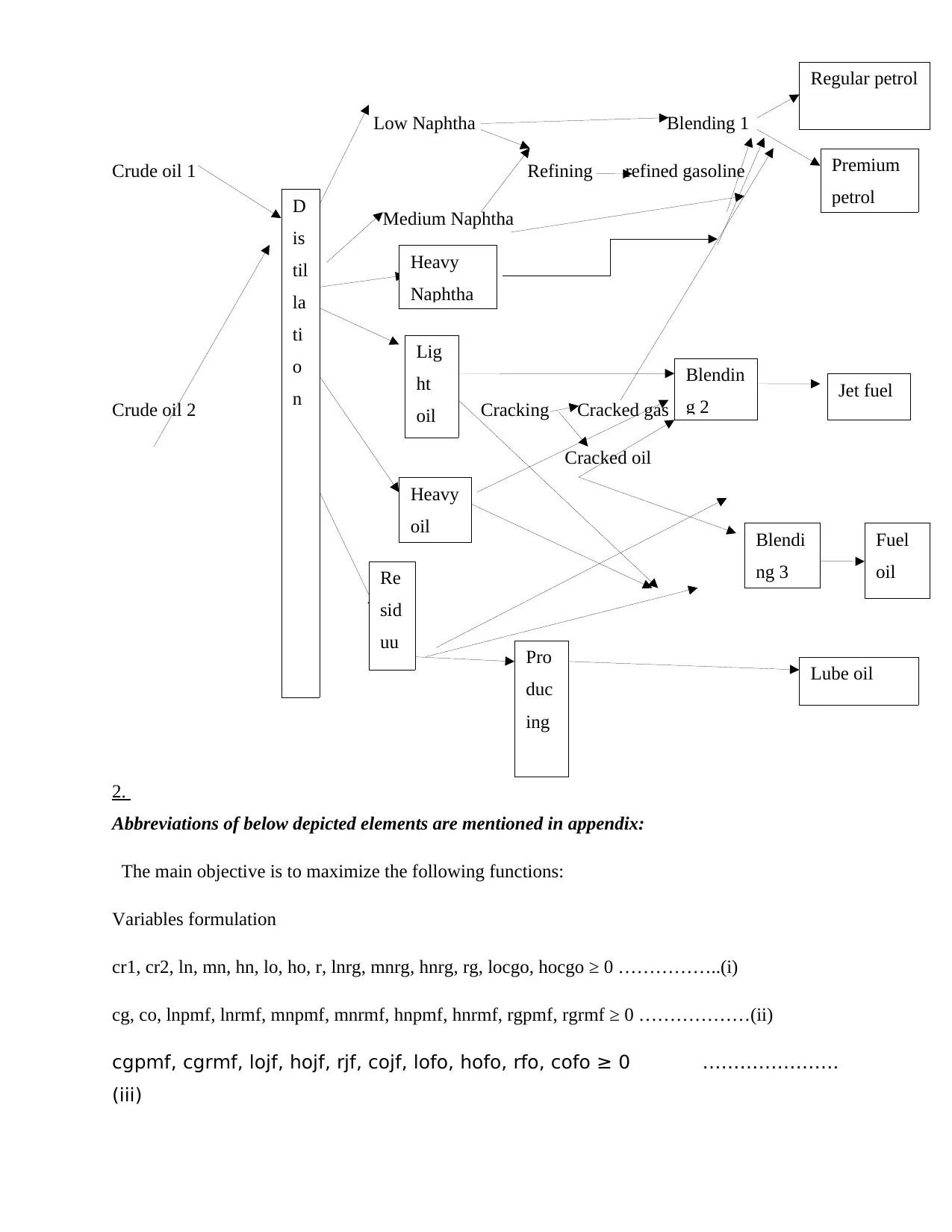
Low Naphtha Blending 1
Crude oil 1 Refining refined gasoline
Medium Naphtha
Crude oil 2 Cracking Cracked gas
Cracked oil
2.
Abbreviations of below depicted elements are mentioned in appendix:
The main objective is to maximize the following functions:
Variables formulation
cr1, cr2, ln, mn, hn, lo, ho, r, lnrg, mnrg, hnrg, rg, locgo, hocgo ≥ 0 ……………..(i)
cg, co, lnpmf, lnrmf, mnpmf, mnrmf, hnpmf, hnrmf, rgpmf, rgrmf ≥ 0 ………………(ii)
cgpmf, cgrmf, lojf, hojf, rjf, cojf, lofo, hofo, rfo, cofo ≥ 0 ………………….
(iii)
D
is
til
la
ti
o
n
Regular petrol
Premium
petrol
Re
sid
uu
m
Heavy
oil
Lig
ht
oil
Heavy
Naphtha
Pro
duc
ing
Lube oil
Blendin
g 2 Jet fuel
Blendi
ng 3
Fuel
oil
Crude oil 1 Refining refined gasoline
Medium Naphtha
Crude oil 2 Cracking Cracked gas
Cracked oil
2.
Abbreviations of below depicted elements are mentioned in appendix:
The main objective is to maximize the following functions:
Variables formulation
cr1, cr2, ln, mn, hn, lo, ho, r, lnrg, mnrg, hnrg, rg, locgo, hocgo ≥ 0 ……………..(i)
cg, co, lnpmf, lnrmf, mnpmf, mnrmf, hnpmf, hnrmf, rgpmf, rgrmf ≥ 0 ………………(ii)
cgpmf, cgrmf, lojf, hojf, rjf, cojf, lofo, hofo, rfo, cofo ≥ 0 ………………….
(iii)
D
is
til
la
ti
o
n
Regular petrol
Premium
petrol
Re
sid
uu
m
Heavy
oil
Lig
ht
oil
Heavy
Naphtha
Pro
duc
ing
Lube oil
Blendin
g 2 Jet fuel
Blendi
ng 3
Fuel
oil
Paraphrase This Document
Need a fresh take? Get an instant paraphrase of this document with our AI Paraphraser
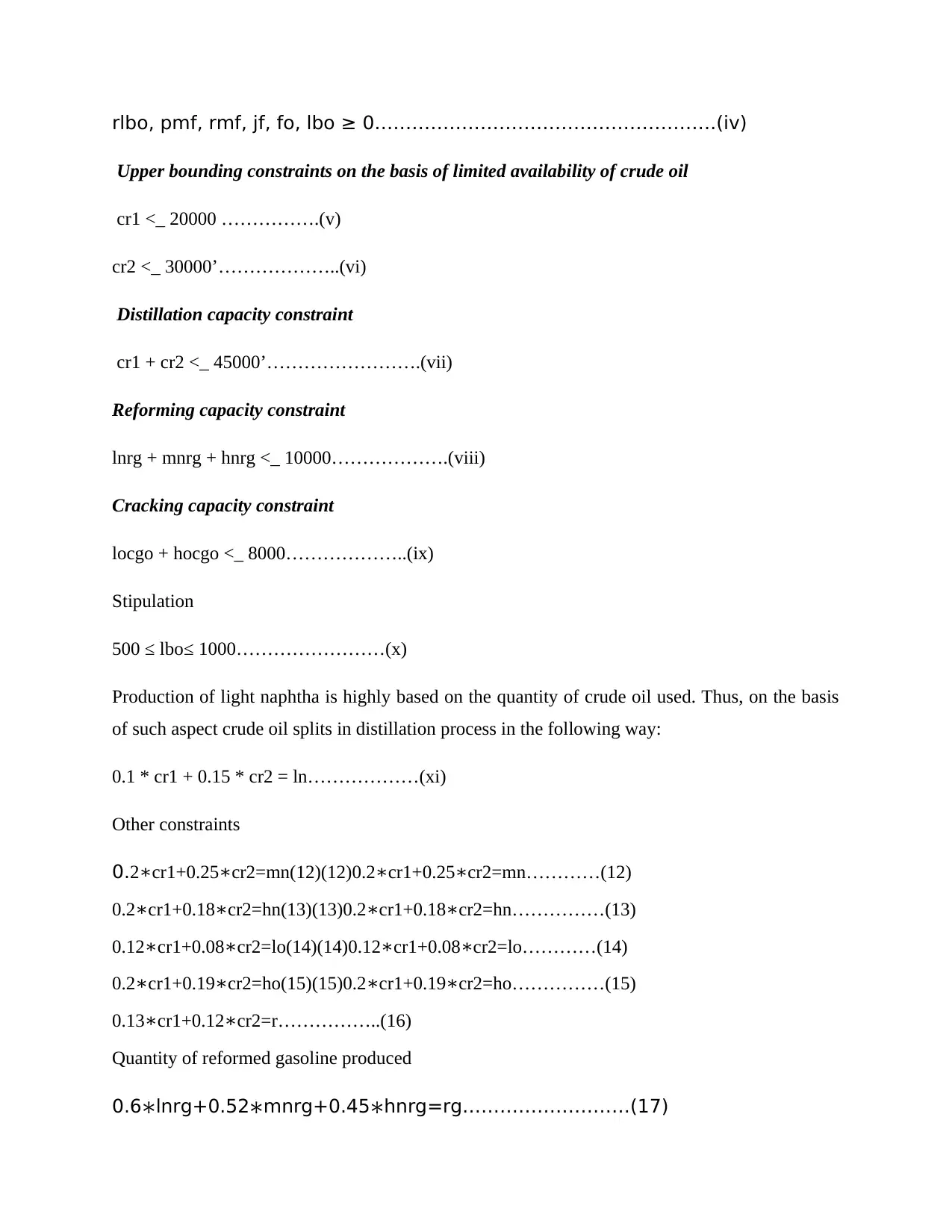
rlbo, pmf, rmf, jf, fo, lbo ≥ 0……………………………………………….(iv)
Upper bounding constraints on the basis of limited availability of crude oil
cr1 <_ 20000 …………….(v)
cr2 <_ 30000’………………..(vi)
Distillation capacity constraint
cr1 + cr2 <_ 45000’…………………….(vii)
Reforming capacity constraint
lnrg + mnrg + hnrg <_ 10000……………….(viii)
Cracking capacity constraint
locgo + hocgo <_ 8000………………..(ix)
Stipulation
500 ≤ lbo≤ 1000……………………(x)
Production of light naphtha is highly based on the quantity of crude oil used. Thus, on the basis
of such aspect crude oil splits in distillation process in the following way:
0.1 * cr1 + 0.15 * cr2 = ln………………(xi)
Other constraints
0.2 cr1+0.25 cr2=mn(12)(12)0.2 cr1+0.25 cr2=mn…………(12)∗ ∗ ∗ ∗
0.2 cr1+0.18 cr2=hn(13)(13)0.2 cr1+0.18 cr2=hn……………(13)∗ ∗ ∗ ∗
0.12 cr1+0.08 cr2=lo(14)(14)0.12 cr1+0.08 cr2=lo…………(14)∗ ∗ ∗ ∗
0.2 cr1+0.19 cr2=ho(15)(15)0.2 cr1+0.19 cr2=ho……………(15)∗ ∗ ∗ ∗
0.13 cr1+0.12 cr2=r……………..(16)∗ ∗
Quantity of reformed gasoline produced
0.6∗lnrg+0.52∗mnrg+0.45∗hnrg=rg………………………(17)
Upper bounding constraints on the basis of limited availability of crude oil
cr1 <_ 20000 …………….(v)
cr2 <_ 30000’………………..(vi)
Distillation capacity constraint
cr1 + cr2 <_ 45000’…………………….(vii)
Reforming capacity constraint
lnrg + mnrg + hnrg <_ 10000……………….(viii)
Cracking capacity constraint
locgo + hocgo <_ 8000………………..(ix)
Stipulation
500 ≤ lbo≤ 1000……………………(x)
Production of light naphtha is highly based on the quantity of crude oil used. Thus, on the basis
of such aspect crude oil splits in distillation process in the following way:
0.1 * cr1 + 0.15 * cr2 = ln………………(xi)
Other constraints
0.2 cr1+0.25 cr2=mn(12)(12)0.2 cr1+0.25 cr2=mn…………(12)∗ ∗ ∗ ∗
0.2 cr1+0.18 cr2=hn(13)(13)0.2 cr1+0.18 cr2=hn……………(13)∗ ∗ ∗ ∗
0.12 cr1+0.08 cr2=lo(14)(14)0.12 cr1+0.08 cr2=lo…………(14)∗ ∗ ∗ ∗
0.2 cr1+0.19 cr2=ho(15)(15)0.2 cr1+0.19 cr2=ho……………(15)∗ ∗ ∗ ∗
0.13 cr1+0.12 cr2=r……………..(16)∗ ∗
Quantity of reformed gasoline produced
0.6∗lnrg+0.52∗mnrg+0.45∗hnrg=rg………………………(17)
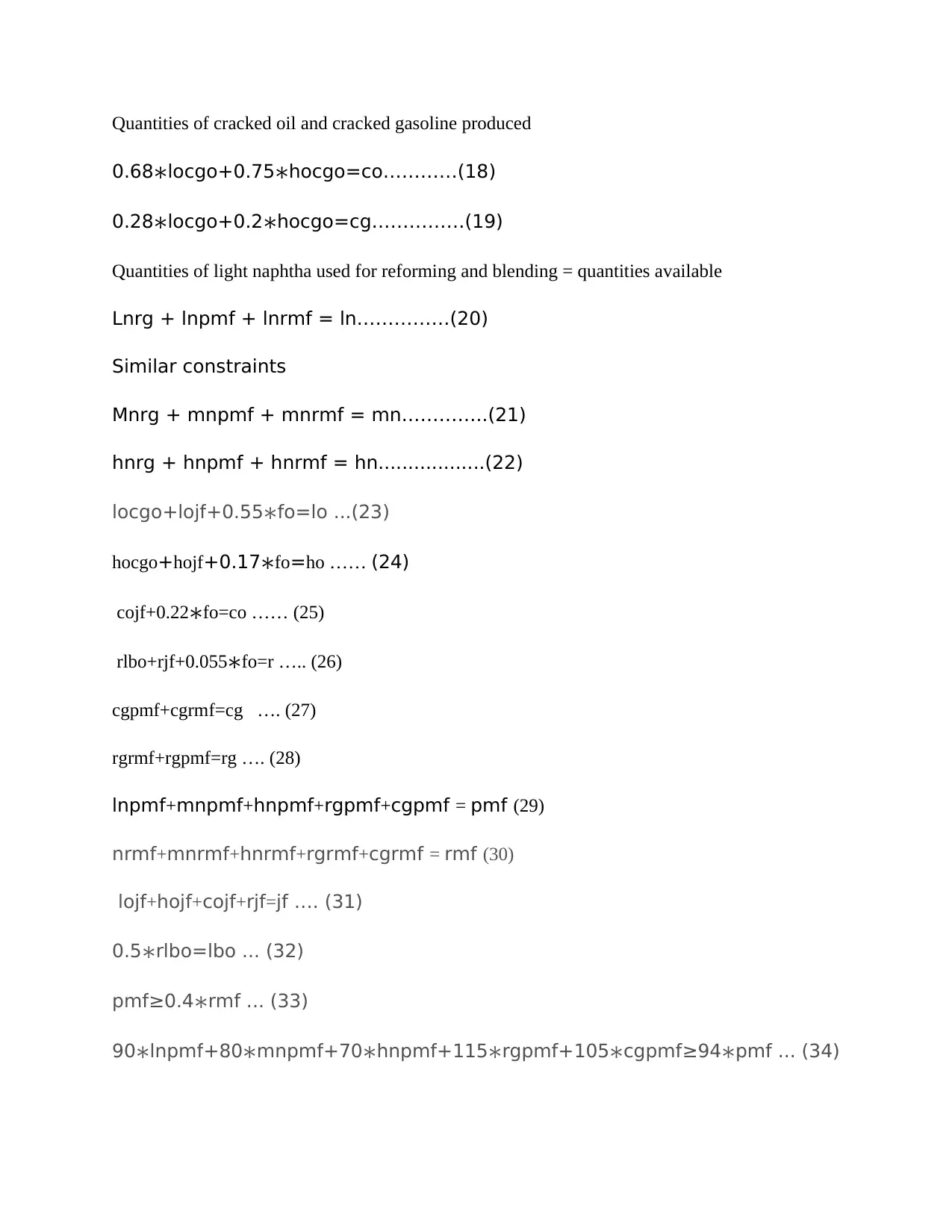
Quantities of cracked oil and cracked gasoline produced
0.68∗locgo+0.75∗hocgo=co…………(18)
0.28∗locgo+0.2∗hocgo=cg……………(19)
Quantities of light naphtha used for reforming and blending = quantities available
Lnrg + lnpmf + lnrmf = ln……………(20)
Similar constraints
Mnrg + mnpmf + mnrmf = mn…………..(21)
hnrg + hnpmf + hnrmf = hn..................(22)
locgo+lojf+0.55∗fo=lo ...(23)
hocgo+hojf+0.17∗fo=ho …… (24)
cojf+0.22∗fo=co …… (25)
rlbo+rjf+0.055∗fo=r ….. (26)
cgpmf+cgrmf=cg …. (27)
rgrmf+rgpmf=rg …. (28)
lnpmf+mnpmf+hnpmf+rgpmf+cgpmf = pmf (29)
nrmf+mnrmf+hnrmf+rgrmf+cgrmf = rmf (30)
lojf+hojf+cojf+rjf=jf …. (31)
0.5∗rlbo=lbo ... (32)
pmf≥0.4∗rmf ... (33)
90∗lnpmf+80∗mnpmf+70∗hnpmf+115∗rgpmf+105∗cgpmf≥94∗pmf ... (34)
0.68∗locgo+0.75∗hocgo=co…………(18)
0.28∗locgo+0.2∗hocgo=cg……………(19)
Quantities of light naphtha used for reforming and blending = quantities available
Lnrg + lnpmf + lnrmf = ln……………(20)
Similar constraints
Mnrg + mnpmf + mnrmf = mn…………..(21)
hnrg + hnpmf + hnrmf = hn..................(22)
locgo+lojf+0.55∗fo=lo ...(23)
hocgo+hojf+0.17∗fo=ho …… (24)
cojf+0.22∗fo=co …… (25)
rlbo+rjf+0.055∗fo=r ….. (26)
cgpmf+cgrmf=cg …. (27)
rgrmf+rgpmf=rg …. (28)
lnpmf+mnpmf+hnpmf+rgpmf+cgpmf = pmf (29)
nrmf+mnrmf+hnrmf+rgrmf+cgrmf = rmf (30)
lojf+hojf+cojf+rjf=jf …. (31)
0.5∗rlbo=lbo ... (32)
pmf≥0.4∗rmf ... (33)
90∗lnpmf+80∗mnpmf+70∗hnpmf+115∗rgpmf+105∗cgpmf≥94∗pmf ... (34)
⊘ This is a preview!⊘
Do you want full access?
Subscribe today to unlock all pages.

Trusted by 1+ million students worldwide
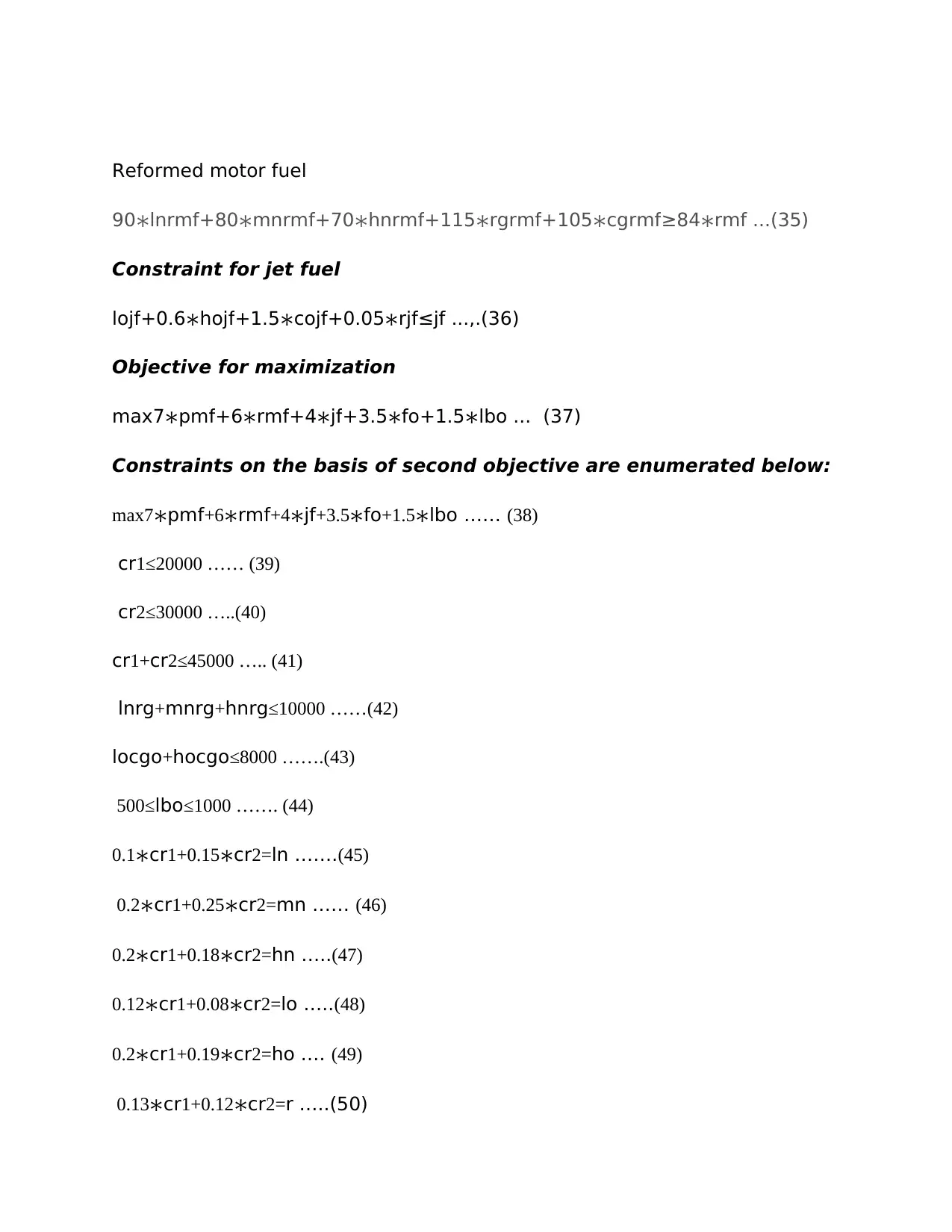
Reformed motor fuel
90∗lnrmf+80∗mnrmf+70∗hnrmf+115∗rgrmf+105∗cgrmf≥84∗rmf ...(35)
Constraint for jet fuel
lojf+0.6∗hojf+1.5∗cojf+0.05∗rjf≤jf ...,.(36)
Objective for maximization
max7∗pmf+6∗rmf+4∗jf+3.5∗fo+1.5∗lbo ... (37)
Constraints on the basis of second objective are enumerated below:
max7∗pmf+6∗rmf+4∗jf+3.5∗fo+1.5∗lbo …… (38)
cr1≤20000 …… (39)
cr2≤30000 …..(40)
cr1+cr2≤45000 ….. (41)
lnrg+mnrg+hnrg≤10000 ……(42)
locgo+hocgo≤8000 …….(43)
500≤lbo≤1000 ……. (44)
0.1∗cr1+0.15∗cr2=ln …….(45)
0.2∗cr1+0.25∗cr2=mn …… (46)
0.2∗cr1+0.18∗cr2=hn …..(47)
0.12∗cr1+0.08∗cr2=lo …..(48)
0.2∗cr1+0.19∗cr2=ho …. (49)
0.13∗cr1+0.12∗cr2=r …..(50)
90∗lnrmf+80∗mnrmf+70∗hnrmf+115∗rgrmf+105∗cgrmf≥84∗rmf ...(35)
Constraint for jet fuel
lojf+0.6∗hojf+1.5∗cojf+0.05∗rjf≤jf ...,.(36)
Objective for maximization
max7∗pmf+6∗rmf+4∗jf+3.5∗fo+1.5∗lbo ... (37)
Constraints on the basis of second objective are enumerated below:
max7∗pmf+6∗rmf+4∗jf+3.5∗fo+1.5∗lbo …… (38)
cr1≤20000 …… (39)
cr2≤30000 …..(40)
cr1+cr2≤45000 ….. (41)
lnrg+mnrg+hnrg≤10000 ……(42)
locgo+hocgo≤8000 …….(43)
500≤lbo≤1000 ……. (44)
0.1∗cr1+0.15∗cr2=ln …….(45)
0.2∗cr1+0.25∗cr2=mn …… (46)
0.2∗cr1+0.18∗cr2=hn …..(47)
0.12∗cr1+0.08∗cr2=lo …..(48)
0.2∗cr1+0.19∗cr2=ho …. (49)
0.13∗cr1+0.12∗cr2=r …..(50)
Paraphrase This Document
Need a fresh take? Get an instant paraphrase of this document with our AI Paraphraser
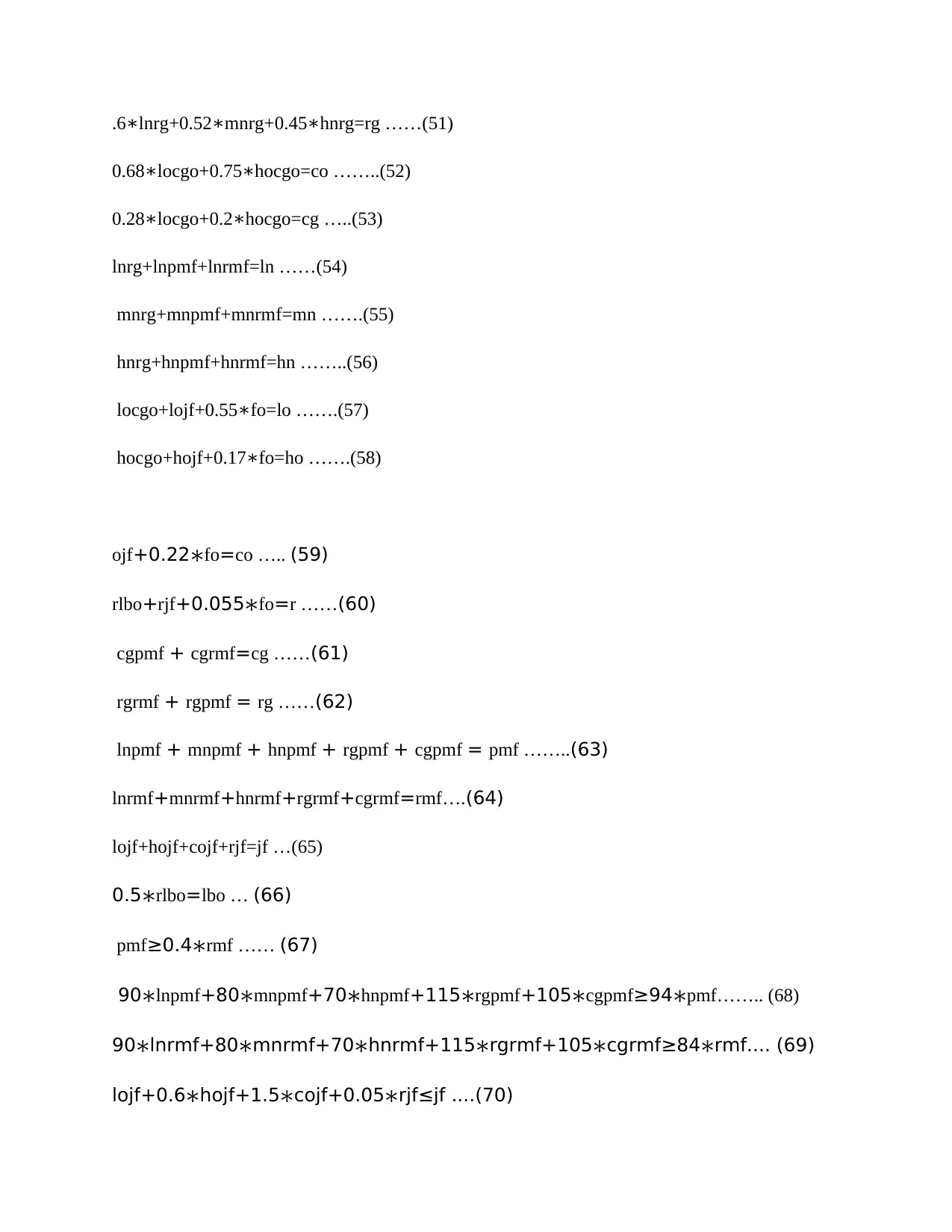
.6 lnrg+0.52 mnrg+0.45 hnrg=rg ……(51)∗ ∗ ∗
0.68 locgo+0.75 hocgo=co ……..(52)∗ ∗
0.28 locgo+0.2 hocgo=cg …..(53)∗ ∗
lnrg+lnpmf+lnrmf=ln ……(54)
mnrg+mnpmf+mnrmf=mn …….(55)
hnrg+hnpmf+hnrmf=hn ……..(56)
locgo+lojf+0.55 fo=lo …….(57)∗
hocgo+hojf+0.17 fo=ho …….(58)∗
ojf+0.22∗fo=co ….. (59)
rlbo+rjf+0.055∗fo=r ……(60)
cgpmf + cgrmf=cg ……(61)
rgrmf + rgpmf = rg ……(62)
lnpmf + mnpmf + hnpmf + rgpmf + cgpmf = pmf ……..(63)
lnrmf+mnrmf+hnrmf+rgrmf+cgrmf=rmf….(64)
lojf+hojf+cojf+rjf=jf …(65)
0.5∗rlbo=lbo … (66)
pmf≥0.4∗rmf …… (67)
90∗lnpmf+80∗mnpmf+70∗hnpmf+115∗rgpmf+105∗cgpmf≥94∗pmf…….. (68)
90∗lnrmf+80∗mnrmf+70∗hnrmf+115∗rgrmf+105∗cgrmf≥84∗rmf.... (69)
lojf+0.6∗hojf+1.5∗cojf+0.05∗rjf≤jf ....(70)
0.68 locgo+0.75 hocgo=co ……..(52)∗ ∗
0.28 locgo+0.2 hocgo=cg …..(53)∗ ∗
lnrg+lnpmf+lnrmf=ln ……(54)
mnrg+mnpmf+mnrmf=mn …….(55)
hnrg+hnpmf+hnrmf=hn ……..(56)
locgo+lojf+0.55 fo=lo …….(57)∗
hocgo+hojf+0.17 fo=ho …….(58)∗
ojf+0.22∗fo=co ….. (59)
rlbo+rjf+0.055∗fo=r ……(60)
cgpmf + cgrmf=cg ……(61)
rgrmf + rgpmf = rg ……(62)
lnpmf + mnpmf + hnpmf + rgpmf + cgpmf = pmf ……..(63)
lnrmf+mnrmf+hnrmf+rgrmf+cgrmf=rmf….(64)
lojf+hojf+cojf+rjf=jf …(65)
0.5∗rlbo=lbo … (66)
pmf≥0.4∗rmf …… (67)
90∗lnpmf+80∗mnpmf+70∗hnpmf+115∗rgpmf+105∗cgpmf≥94∗pmf…….. (68)
90∗lnrmf+80∗mnrmf+70∗hnrmf+115∗rgrmf+105∗cgrmf≥84∗rmf.... (69)
lojf+0.6∗hojf+1.5∗cojf+0.05∗rjf≤jf ....(70)
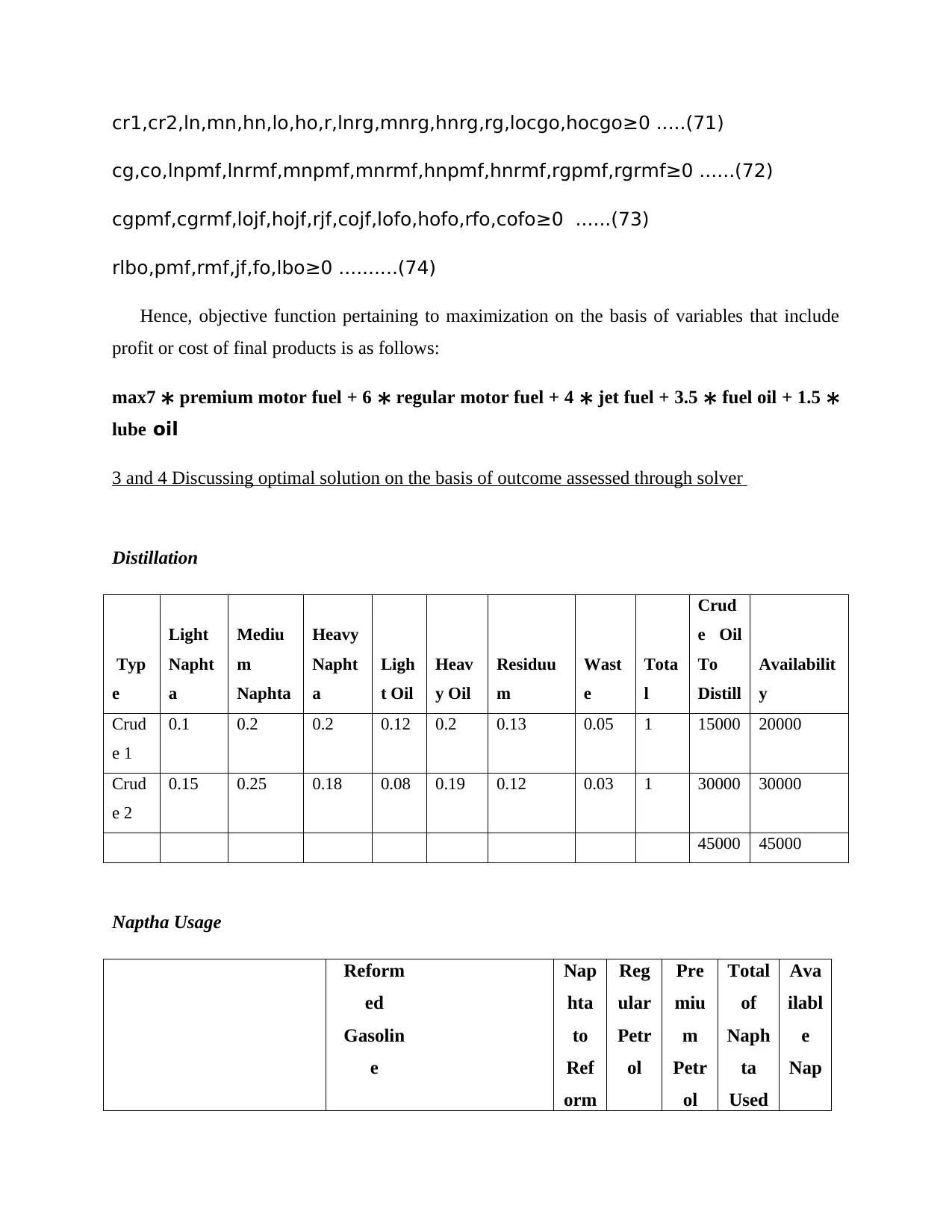
cr1,cr2,ln,mn,hn,lo,ho,r,lnrg,mnrg,hnrg,rg,locgo,hocgo≥0 .....(71)
cg,co,lnpmf,lnrmf,mnpmf,mnrmf,hnpmf,hnrmf,rgpmf,rgrmf≥0 ......(72)
cgpmf,cgrmf,lojf,hojf,rjf,cojf,lofo,hofo,rfo,cofo≥0 ......(73)
rlbo,pmf,rmf,jf,fo,lbo≥0 ..........(74)
Hence, objective function pertaining to maximization on the basis of variables that include
profit or cost of final products is as follows:
max7 ∗ premium motor fuel + 6 ∗ regular motor fuel + 4 ∗ jet fuel + 3.5 ∗ fuel oil + 1.5 ∗
lube oil
3 and 4 Discussing optimal solution on the basis of outcome assessed through solver
Distillation
Typ
e
Light
Napht
a
Mediu
m
Naphta
Heavy
Napht
a
Ligh
t Oil
Heav
y Oil
Residuu
m
Wast
e
Tota
l
Crud
e Oil
To
Distill
Availabilit
y
Crud
e 1
0.1 0.2 0.2 0.12 0.2 0.13 0.05 1 15000 20000
Crud
e 2
0.15 0.25 0.18 0.08 0.19 0.12 0.03 1 30000 30000
45000 45000
Naptha Usage
Reform
ed
Gasolin
e
Nap
hta
to
Ref
orm
Reg
ular
Petr
ol
Pre
miu
m
Petr
ol
Total
of
Naph
ta
Used
Ava
ilabl
e
Nap
cg,co,lnpmf,lnrmf,mnpmf,mnrmf,hnpmf,hnrmf,rgpmf,rgrmf≥0 ......(72)
cgpmf,cgrmf,lojf,hojf,rjf,cojf,lofo,hofo,rfo,cofo≥0 ......(73)
rlbo,pmf,rmf,jf,fo,lbo≥0 ..........(74)
Hence, objective function pertaining to maximization on the basis of variables that include
profit or cost of final products is as follows:
max7 ∗ premium motor fuel + 6 ∗ regular motor fuel + 4 ∗ jet fuel + 3.5 ∗ fuel oil + 1.5 ∗
lube oil
3 and 4 Discussing optimal solution on the basis of outcome assessed through solver
Distillation
Typ
e
Light
Napht
a
Mediu
m
Naphta
Heavy
Napht
a
Ligh
t Oil
Heav
y Oil
Residuu
m
Wast
e
Tota
l
Crud
e Oil
To
Distill
Availabilit
y
Crud
e 1
0.1 0.2 0.2 0.12 0.2 0.13 0.05 1 15000 20000
Crud
e 2
0.15 0.25 0.18 0.08 0.19 0.12 0.03 1 30000 30000
45000 45000
Naptha Usage
Reform
ed
Gasolin
e
Nap
hta
to
Ref
orm
Reg
ular
Petr
ol
Pre
miu
m
Petr
ol
Total
of
Naph
ta
Used
Ava
ilabl
e
Nap
⊘ This is a preview!⊘
Do you want full access?
Subscribe today to unlock all pages.

Trusted by 1+ million students worldwide
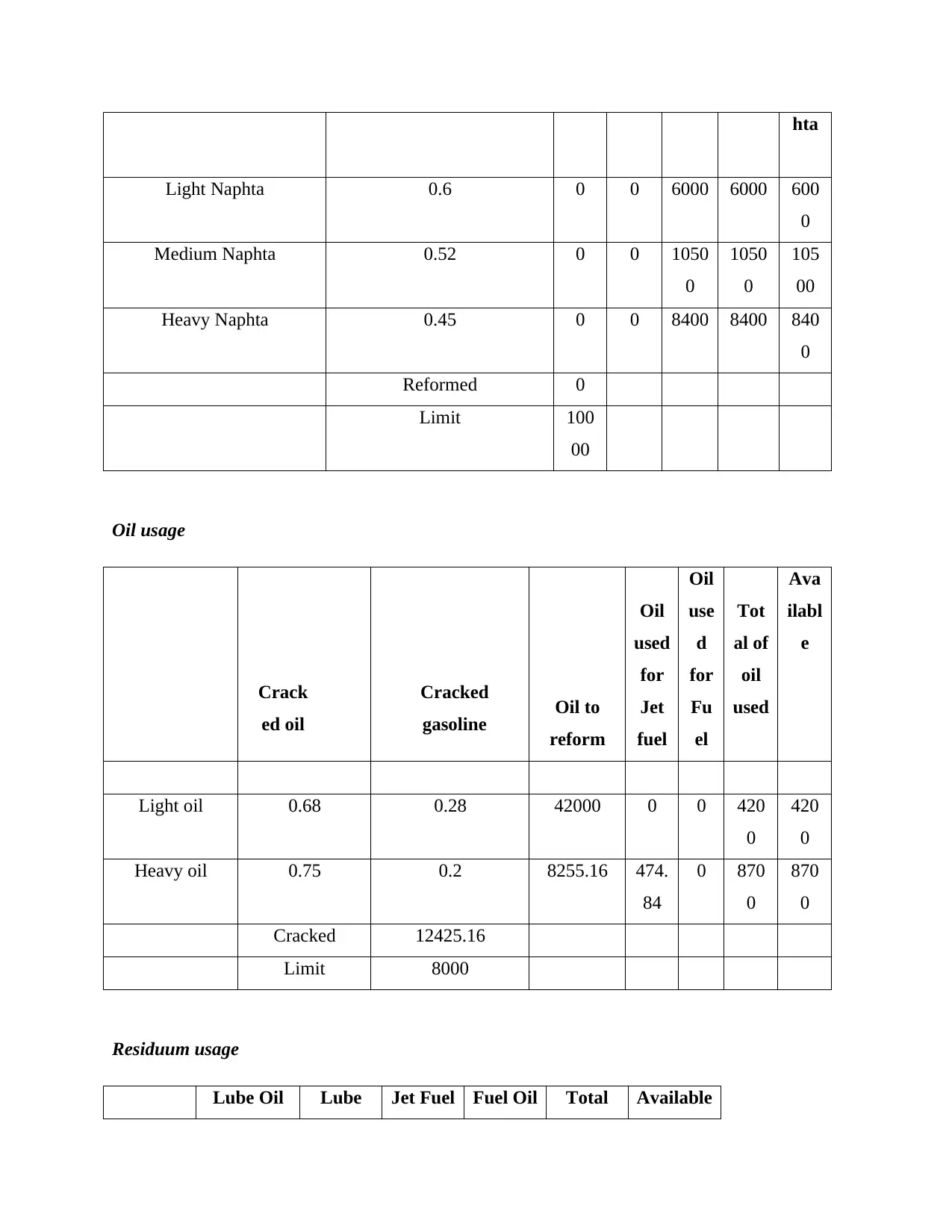
hta
Light Naphta 0.6 0 0 6000 6000 600
0
Medium Naphta 0.52 0 0 1050
0
1050
0
105
00
Heavy Naphta 0.45 0 0 8400 8400 840
0
Reformed 0
Limit 100
00
Oil usage
Crack
ed oil
Cracked
gasoline Oil to
reform
Oil
used
for
Jet
fuel
Oil
use
d
for
Fu
el
Tot
al of
oil
used
Ava
ilabl
e
Light oil 0.68 0.28 42000 0 0 420
0
420
0
Heavy oil 0.75 0.2 8255.16 474.
84
0 870
0
870
0
Cracked 12425.16
Limit 8000
Residuum usage
Lube Oil Lube Jet Fuel Fuel Oil Total Available
Light Naphta 0.6 0 0 6000 6000 600
0
Medium Naphta 0.52 0 0 1050
0
1050
0
105
00
Heavy Naphta 0.45 0 0 8400 8400 840
0
Reformed 0
Limit 100
00
Oil usage
Crack
ed oil
Cracked
gasoline Oil to
reform
Oil
used
for
Jet
fuel
Oil
use
d
for
Fu
el
Tot
al of
oil
used
Ava
ilabl
e
Light oil 0.68 0.28 42000 0 0 420
0
420
0
Heavy oil 0.75 0.2 8255.16 474.
84
0 870
0
870
0
Cracked 12425.16
Limit 8000
Residuum usage
Lube Oil Lube Jet Fuel Fuel Oil Total Available
Paraphrase This Document
Need a fresh take? Get an instant paraphrase of this document with our AI Paraphraser
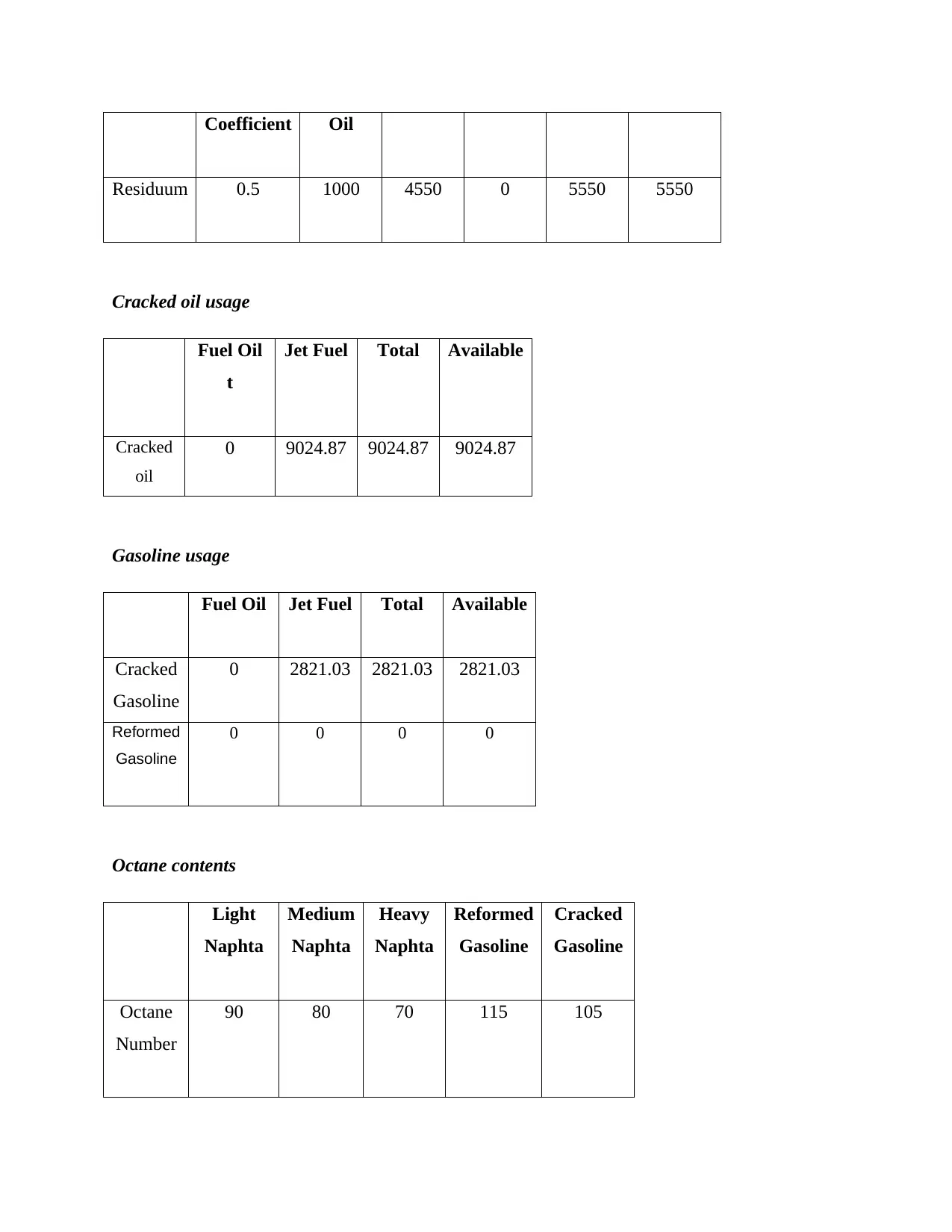
Coefficient Oil
Residuum 0.5 1000 4550 0 5550 5550
Cracked oil usage
Fuel Oil
t
Jet Fuel Total Available
Cracked
oil
0 9024.87 9024.87 9024.87
Gasoline usage
Fuel Oil Jet Fuel Total Available
Cracked
Gasoline
0 2821.03 2821.03 2821.03
Reformed
Gasoline
0 0 0 0
Octane contents
Light
Naphta
Medium
Naphta
Heavy
Naphta
Reformed
Gasoline
Cracked
Gasoline
Octane
Number
90 80 70 115 105
Residuum 0.5 1000 4550 0 5550 5550
Cracked oil usage
Fuel Oil
t
Jet Fuel Total Available
Cracked
oil
0 9024.87 9024.87 9024.87
Gasoline usage
Fuel Oil Jet Fuel Total Available
Cracked
Gasoline
0 2821.03 2821.03 2821.03
Reformed
Gasoline
0 0 0 0
Octane contents
Light
Naphta
Medium
Naphta
Heavy
Naphta
Reformed
Gasoline
Cracked
Gasoline
Octane
Number
90 80 70 115 105
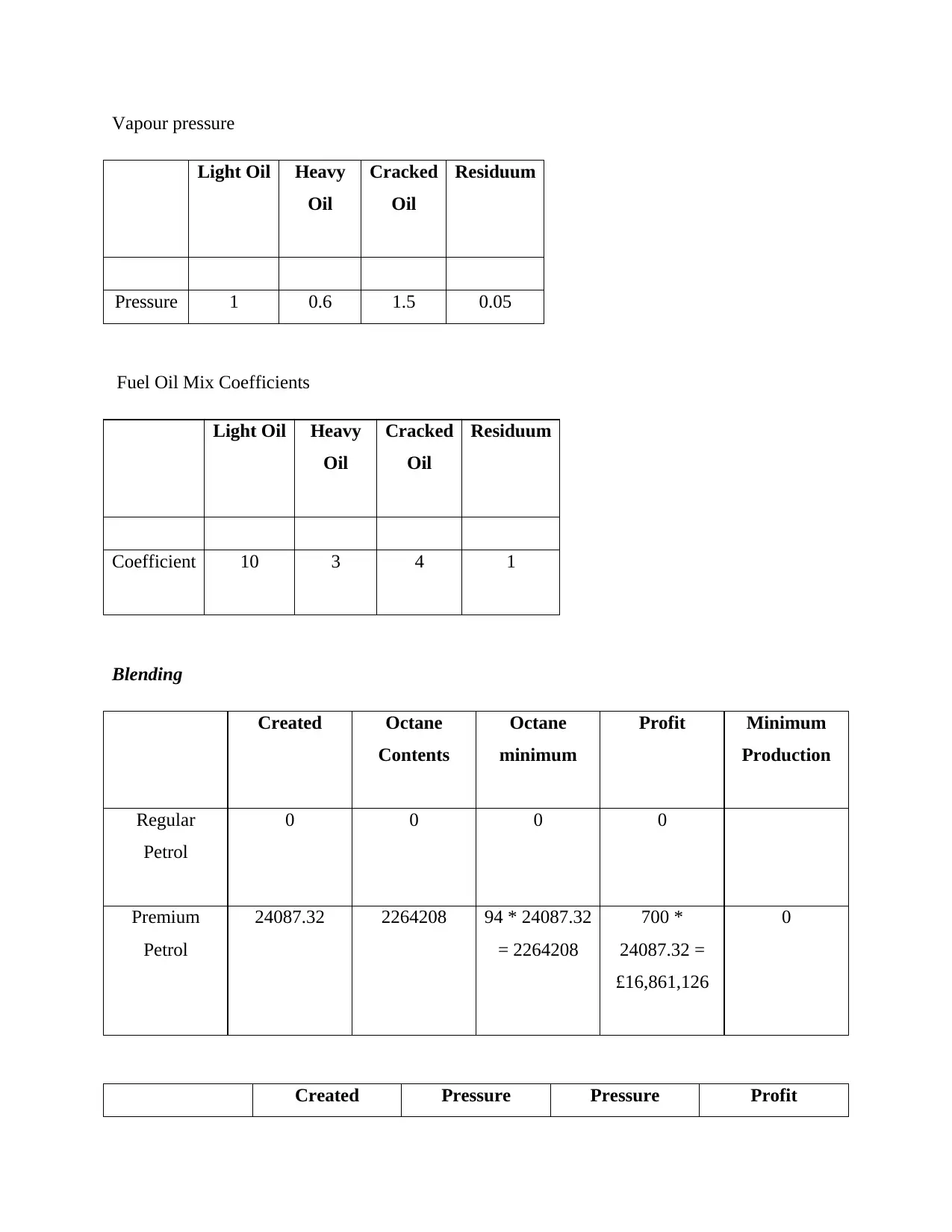
Vapour pressure
Light Oil Heavy
Oil
Cracked
Oil
Residuum
Pressure 1 0.6 1.5 0.05
Fuel Oil Mix Coefficients
Light Oil Heavy
Oil
Cracked
Oil
Residuum
Coefficient 10 3 4 1
Blending
Created Octane
Contents
Octane
minimum
Profit Minimum
Production
Regular
Petrol
0 0 0 0
Premium
Petrol
24087.32 2264208 94 * 24087.32
= 2264208
700 *
24087.32 =
£16,861,126
0
Created Pressure Pressure Profit
Light Oil Heavy
Oil
Cracked
Oil
Residuum
Pressure 1 0.6 1.5 0.05
Fuel Oil Mix Coefficients
Light Oil Heavy
Oil
Cracked
Oil
Residuum
Coefficient 10 3 4 1
Blending
Created Octane
Contents
Octane
minimum
Profit Minimum
Production
Regular
Petrol
0 0 0 0
Premium
Petrol
24087.32 2264208 94 * 24087.32
= 2264208
700 *
24087.32 =
£16,861,126
0
Created Pressure Pressure Profit
⊘ This is a preview!⊘
Do you want full access?
Subscribe today to unlock all pages.

Trusted by 1+ million students worldwide
1 out of 18
Your All-in-One AI-Powered Toolkit for Academic Success.
+13062052269
info@desklib.com
Available 24*7 on WhatsApp / Email
![[object Object]](/_next/static/media/star-bottom.7253800d.svg)
Unlock your academic potential
Copyright © 2020–2026 A2Z Services. All Rights Reserved. Developed and managed by ZUCOL.

